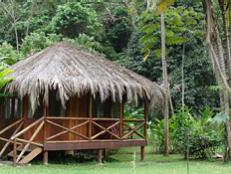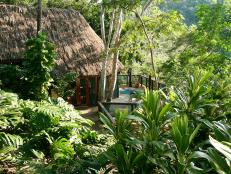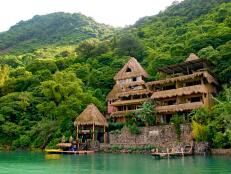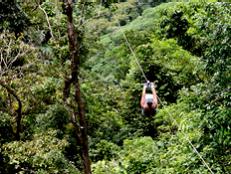Minimize Your Carbon Footprint at These Eco-Friendly Destinations
The Azores, Bhutan and Rottnest Island, Australia are just a small sampling of some of the world's most eco-friendly places.
Related To:
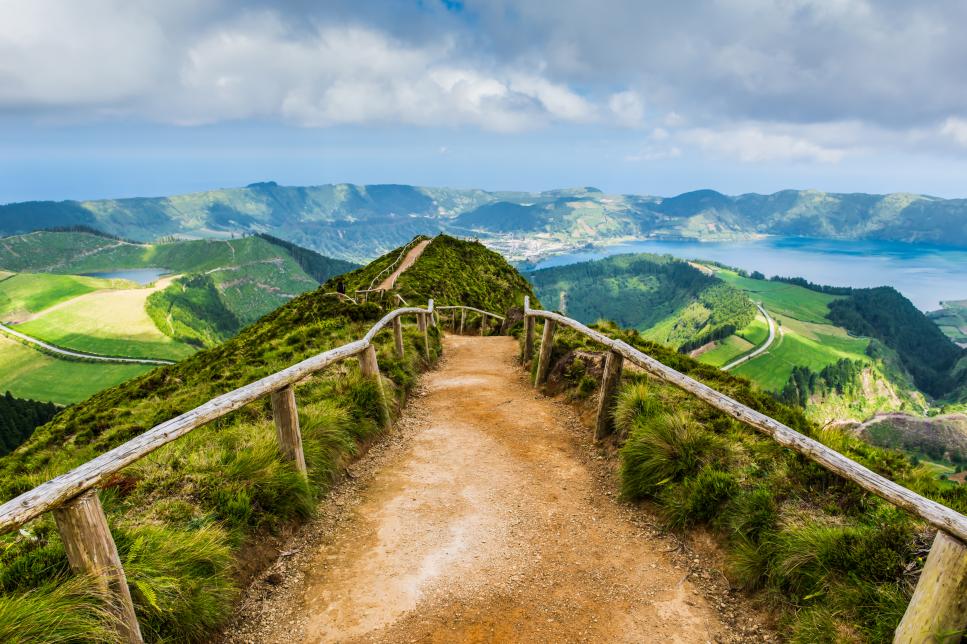
Photo By: VickySP
Photo By: Volcanoes Safaris
Photo By: iStockphotos.com/Jason Doiy
Photo By: Paul Kennedy
Photo By: Six Senses Hotels Resorts Spas
Photo By: Shutterstock/Trisha McQuade
Photo By: Thinkstock
Photo By: Derrick See/Singapore Tourism Board
Photo By: Lapa Rios Lodge
Photo By: Mike Hewitt - FIFA
Azores
The majority of the Azores, an autonomous archipelago chain that’s part of Portugal, are protected from commercial or industrial development. In fact, three of its islands are UNESCO biospheres, and the local government places an emphasis on renewable energy. In 2017, Graciosa, the third smallest island, generated the majority of its power from a mix of solar, wind and battery grid storage, with other islands following suit. So, it makes sense that sustainable tourism is a huge draw for each of the nine volcanic islands, with tourists enjoying unpolluted lakes, undeveloped landscapes and an abundance of wildlife. In April 2019, there’s talk of a new eco-resort opening on Pico, an island known for its wine-making scene. Called Lava Homes, the 70-bed hotel will feature ocean views and reportedly be constructed from local basalt.
Rwanda
Thanks to primatologist Dian Fossey, Rwanda has spent decades preserving its endangered mountain gorillas. In 2017, the country took further action to protect them by increasing trekking permits from $750 to $1,500 in order to maintain sustainable tourism and support local communities. Plus, a new campus for gorilla scientists will be built in the near future, thanks to celebrity Ellen DeGeneres and the Dian Fossey Gorilla Fund. Rwanda also reintroduced black rhinos into Akagera National Park, 10 years after poaching eliminated the population. Beyond Rwanda’s wildlife focus, the country was among the first to ban plastic bags back in 2008. Since then, it’s been working toward numerous environmental goals, such as using more renewable energy and trying to restore 30 percent of its forests by 2020. So far, Nyungwe, Gishwati and Mukura are now national parks. On the ecolodge front, a spate of sustainable luxury hotels will be joining existing ones like the newish Bisate Lodge from Wilderness Safaris, which specializes in gorilla treks and community projects. Next up from Wilderness Safaris is Magashi Camp, slated to open March 2019 in Akagera National Park, with black rhinos as part of its conservation focus.
San Francisco
San Francisco is easily one of the most eco-friendly destinations in the U.S. In 2007, it became the first domestic city to ban plastic shopping bags, and it has even larger ambitions to become a zero waste city by 2020. This doesn’t mean the city won’t create any trash, but that waste is reused or recycled instead of going to the landfill. In terms of greenhouse gas emissions, 2016 numbers were 30 percent below levels in 1990, and the city is working to transition all of its buses and light rail transportation to hybrid electric by 2020. A growing number of hotels are LEED-certified, a green designation, while a prevalence of healthy, organic and locally sourced food isn’t a trend so much as a deeply ingrained part of the culture. Visit the sprawling farmers market at the iconic Ferry Building (pictured) to fully experience this scene.
Galapagos Islands
Ecuador’s famed Galapagos Islands are home to large numbers of native and diverse species, from giant tortoises to sea lions. UNESCO designated the Galapagos a World Heritage Site in 1979, and both the Galapagos National Park and the Ecuadorian Ministry of Tourism mandate eco-friendly rules for travel companies, the majority of which are cruises. Among the rules are conserving water and energy, using locally produced products and recycling waste. Be sure to research companies to ensure that you’re traveling with a truly responsible operator. Some, like Intrepid Travel, take extra steps that aren’t required, such as carbon offsetting every trip and traveling with small groups. On the new front, luxury cruise company Ecoventura will be launching a new ship in March 2019. The MV Theory will combine luxury features (rainfall showers, fitness center) with eco-friendly best practices (serving local food). The Ecuadorian-based company is also reducing the amount of plastic used on board and contributing to environmental programs.
Bhutan
The tiny Buddhist kingdom of Bhutan didn’t permit tourism until the '70s, allowing the country to tightly preserve its culture. Although its borders are now more open, new development remains low since Bhutan’s constitution stipulates that at least 60 percent of the land must remain forested (72 percent of Bhutan is currently tree-covered). But environmental concerns don’t end there for a country that prioritizes Gross National Happiness, a four-pillar concept that counts environmental conservation and sustainable development among the pillars. As such, Bhutan’s current eco-friendly initiatives aim for producing only organic produce by 2020 and increasing the number of electric cars and charging stations. To this end, the country is already the first to become carbon negative, meaning that it removes more greenhouse gases, like carbon dioxide, than it creates. Even more impressive, Bhutan’s most ambitious plan entails becoming a zero waste country by 2030. In major 2019 news, five new eco-friendly hotels from the high-end Six Senses chain will begin opening around the country, with each reflecting the particular characteristics of its location.
Rottnest Island
Rottnest Island is a little blip of land off the coast of Perth in Western Australia. If you like animals, car-free Rottnest is named for its thriving quokka community, cat-sized marsupials that have been dubbed the world’s happiest animal. It’s not hard to see why, since Rottnest is a peaceful place known for its beaches, coral reefs and hiking trails. It’s also a place that puts sustainability first and is currently increasing the amount of energy produced by wind turbines and solar power. Other initiatives involve wastewater management, protected marine areas and even eco-friendly coffee cups. While there’s a range of lodging on Rottnest, the newest addition in 30 years will be Discovery Rottnest Island, an eco-friendly glamp resort near Pinky Beach (pictured) planned for March 2019.
Scandinavia
It’s difficult choosing just one eco-friendly country in Scandinavia when practically all of them are leading the way on this front. For example, Norway (pictured) features 13 areas that are considered a sustainable destination, meaning that they follow sustainable practices and minimize the impact tourism has on their communities. Meanwhile, Iceland is mostly powered by renewable energy. Over in Sweden, government-run trains use electricity, 85 percent of the country recycles cans and bottles and Stockholm’s airport slashed greenhouse gas emissions in half since 2004. Denmark is a huge proponent of organic food and cycling, while Copenhagen is aiming to become carbon neutral by 2025. Not least, Finland has worked hard to reduce carbon emissions and protect its natural environment.
Singapore
Despite being one of the world’s most densely populated cities, Singapore has demonstrated a commitment to numerous green initiatives. For example, in 2005 the government launched its own green designation, required for all new construction. Besides following sustainable guidelines, it’s also common to find all manner of plant life in buildings, like vertical walls of greenery. Though not technically plant life, you’ll find solar-powered "trees" (pictured) at Gardens by the Bay, a popular 250-acre botanical garden. Singapore is also setting an example for treating wastewater, which is key for a country with limited water resources. The country makes it easy to locate eco-friendly hotels, boasting features like solar-powered gardens, open-air ventilation and a canopy that harvests rainwater.
Costa Rica
Costa Rica entered the ecotourism arena in the early '90s, long before the concept became trendy. About 30 percent of the land is protected, while an ongoing reforestation project is underway to help reach the country’s goal of becoming carbon neutral (i.e., eliminating carbon dioxide emissions) by 2021. But so far, Costa Rica’s greatest green achievement is relying on renewable resources for 98 percent of its electricity. The country’s eco-lodging scene is also commendable, with a large range in a variety of price points. Head to the remote Osa Peninsula to fully experience the untamed rainforest in eco-friendly lodging (Lapa Rios Lodge, pictured, and Luna Lodge were among the first pioneers), and maintain a sustainable-first mindset.
Vancouver
As part of preserving Vancouver’s natural beauty, the city is ambitiously aiming to become the greenest city in the world by 2020. To achieve this, Vancouver plans on reducing carbon emissions by 33 percent from 2007 levels, planting 150,000 new trees and generating more energy from renewable resources. The overall game plan also encompasses generating zero waste, encouraging public transportation and cycling as the main forms of transportation and designing more green buildings.

